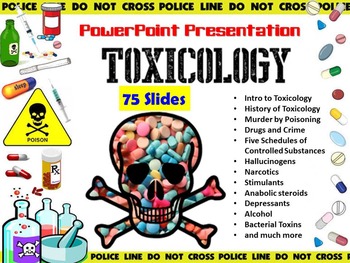2020. 2. 28. 19:48ㆍ카테고리 없음
Forensic toxicologists work in laboratories, often those operated by government agencies or law enforcement, to identify chemicals and compounds that could have contributed to crimes or have other administrative or legal consequences. This can include identifying illicit substances in bodies that may have been the victims of foul play, performing administrative drug testing, or identifying hazardous chemicals in the environment.Forensic toxicologists work primarily in labs with small biological samples, most often obtained from people who have passed away (except in the case of drug testing). They may work closely with forensic pathologists, law enforcement or prosecutors to determine the impact of their findings on legal proceedings. However, toxicologists who primarily conduct drug tests will have different contacts and little to no contact with the legal system.Becoming a forensic toxicologist requires a strong background in science and scientific method, in particular, chemistry and biology as well as an obsessive attention to detail and desire to solve mysteries utilizing science. There are a few paths which interested students can follow in order to learn forensic toxicology and be hired to a toxicology lab position. Outlook for the Forensic Toxicologist CareerThe forensic toxicology career is quite specialized and as such, there is not a lot of available data that is specific only to this job.
However, it is possible to look at the data for related positions and get a good idea as to the outlook for this profession.For instance, the (BLS 2017) predicts that the forensic science technician profession, which includes forensic toxicologists, will grow by 17 percent between 2016 and 2026. There is also overlap between the forensic toxicologist position and medical and clinical laboratory technologists and technicians, a profession that is expected two grow 13 percent over the same period.As far as salary, limited data is available from Payscale.com, which collects self-reported data from forensic toxicologists. Reports that the median pay for forensic toxicologists is $55,267 with the bottom 10 percent earning $34,000 and the top 10 percent earning $91,000 per year. The Payscale data was collected from 30 forensic toxicologists.While highly reliable data is not available for this particular specialty, it is clear that there will likely be growth in the forensic toxicology field over the next ten years. For a better idea of the types of jobs currently available, interested students can peruse the job listings for the.
Forensic Toxicologist SpecialtiesAccording to the (NIST), the four disciplines of forensic toxicology include:. Death Investigation (or Postmortem) Toxicology. Human Performance Toxicology. Doping Control.
Workplace Drug TestingEach of these specializations will require different career paths but overall the pursuit of any of these involves similar steps as listed below.Some forensic toxicologists, particularly those with advanced degrees, may choose to pursue another specialty before entering the forensic toxicology profession. These toxicologists may begin their careers in other chemistry or biological laboratories, including medicinal chemistry, pharmacology, or clinical chemistry. These experiences can be valuable in learning the importance of correct methodology and proper lab procedures.Although largely lab-based, there is still some variety to the setting where a forensic toxicologist might work. Law enforcement or government laboratories are quite common, but toxicologists may also be employed in the private sector in settings such as industrial labs, hospitals, or universities.Indeed, as with many advanced professions, forensic toxicologists may also choose to go on and pursue experience in academia, either concurrent with their laboratory work or as a second career. Forensic toxicologist professors can teach at many levels throughout higher education and are also encouraged to pursue their own research and publication, which can be a great way to advance the forensic toxicologist career beyond the test tube. Education & Licensing Requirements for a Forensic ToxicologistAt minimum, forensic toxicologists should expect to earn a bachelor’s degree in a hard science, such as chemistry, biology, or biochemistry.

While a specific degree in forensic toxicology is not required, applicable coursework should include:. toxicology. pharmacology. chemistryThere is also no legal requirement for certification in this field. However, those that earn an advanced degree are able to apply for certification through the (ABFT) as outlined below. Steps to Become a Forensic ToxicologistFollowing are some of the most common steps that forensic toxicologists follow to begin and advance in their careers:.

Step 1: Graduate high school – A high school diploma or GED are naturally prerequisites to an undergraduate degree. High school students who want to pursue this particular career should be sure to excel in lab sciences like chemistry and biology. Step 2: Pursue an undergraduate degree (2 to 4 years) – While it is possible to find work as a laboratory assistant with a 2-year associate’s degree, those who want to do the toxicology work themselves should be prepared to complete a bachelor’s degree. As mentioned above, a forensic toxicology major is not required (indeed, there are few of these programs available), but students should be sure to become very familiar with laboratory procedures and advanced chemistry, at minimum. Undergraduates should also seek out any hands-on work experience, such as internships, in order to begin building a resume and making professional connections with local labs. Step 3: Seek entry-level experience (timeline varies) – With a completed undergraduate degree, recent graduates can seek out work in a toxicology lab. According to the, hands-on experience is the most important way to further one’s career as a forensic toxicologist.
Classroom training provides a foundation for the career, but there are many intricacies of this challenging profession that can only truly be learned in a working laboratory. Step 4: Consider an advanced degree or certificate (1 to 2 years) – After developing some necessary skills in a toxicology lab, some toxicologists go on to seek advanced training in the form of a graduate certificate or master of science (MS) degree.
For example, the offers an online MS in forensic toxicology program that is designed to be completed by working professionals. An advanced degree can help toxicologists learn more about their chosen specialty while also providing important credentials for seeking leadership positions. A segment of forensic toxicologists also go on to complete PhDs (which can take three years or more), typically so that they can work in academia. Step 5: Apply for professional certificationThe (ABFT) offers four different certification options for those in the career.
Importance Of Forensic Toxicology
Toxicology is the study of chemicals and their harmful effects on living organisms. In forensic toxicology, these harmful chemicals are commonly drugs, alcohol, or poisons. Toxicology has roots in biology, chemistry, and medicine.
While forensic toxicology is often conducted in government-funded labs concerned with law enforcement, it may also be performed by private testing facilities or in medical laboratory.Before running a forensic toxicology test, a sample must first be collected and processed. Samples such as urine, blood, hair, or tissue are collected from a live or dead subject. One of the biggest challenges toxicologists face is trying to get results from very limited sample sizes. This makes it important to run all tests as carefully as possible and to choose equipment with high sensitivity. Techniques that test for multiple contaminants at one time help toxicologists make the most of a single sample.

Range of forensic toxicology products:. instruments are used to separate chemical components before testing. most often follows sample preparation via gas or liquid chromatography and is used to identify the sample’s precise components. Blood chemistry analyzers can be used to check for harmful chemicals that might be present in a blood sample.
Forensic Toxicology Tools
Immunoassays tests can be used to check for specific substance.Search and compare forensic toxicology products.